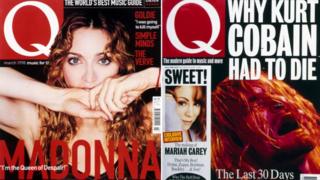Q Magazine to close after 34 years
 Image copyright Bauer Media
Image copyright Bauer Media Q Magazine, a cornerstone of rock journalism in the UK, is to close after 34 years.
«The pandemic did for us and there was nothing more to it than that,» said the editor Ted Kessler in a tweet.
He also shared the editor’s letter for the final issue, due on 28 July, in which he said: «I must apologise for my failure to keep Q afloat.»
The magazine’s circulation had fallen to 28,000 per month from a peak of 200,000 in 2001.
Founded in 1986 by Smash Hits writers Mark Ellen and David Hepworth, Q arrived at the same time as the CD revolution took off – and its glossy, aspirational format chimed perfectly with the times.
Its hefty and comprehensive reviews section not only covered new releases, but the copious re-issues that were starting to appear as record labels plundered their archives to bolster the new format.
Who the hell?
Yet the magazine was characterised as much by its irreverence as its knowledge.
Pop stars lived in fear of ending up in Tom Hibbert’s «Who The Hell Do They Think They Are?» column, which was launched in the late 1980s to «lampoon ego-mania and harpoon narcissism» and ran for several years until PR gurus got wise.
Hibbert had a knack of needling his interviewees until they dispensed with niceties and revealed their true selves: «Don’t nit-pick me, boy,» Jerry Lee Lewis once berated him, after a volley of questions about his rivalry with Elvis Presley.
«You mention Elvis to me again, you keep digging me about that and I’m gonna kill you, so help me God!»
Ringo Starr, meanwhile, was forced to compare his 1992 solo album Time Takes Time with some of his earlier, better, work.
«My album can’t beat the Abbey Road album as an album?» he asked incredulously. «That was 30 years ago, man. I’m still making records and you can hear that I’m a great musician on the new record.
«This is an actual bloody legend in front of you. I’m not expecting you to comb the bloody legend’s hair but if you could mention the new LP and these other fine musicians I’m still playing with.»
But on the whole, Q tended to be on better terms with its subjects.
The first cover star was Paul McCartney, closely followed by Rod Stewart and Elton John (Headline: «The wit, the wisdom, the wardrobe»).
Future editions saw the likes of Madonna, Prince, Kate Bush, Nirvana, a pregnant Britney Spears and a naked Terence Trent D’Arby grace the cover. Former editor Danny Kelly later said he’d worked out that D’Arby was «the only star beautiful enough and egotistical enough to get their kit off».
It flourished during the Britpop years, but saw its reputation stall in the mid-2010s with a listicle format («the 10 greatest gigs of all time» or «the 120 greatest stories in rock ‘n’ roll») that minimised the strength of its journalism.
‘A raving nymphomaniac’
More recently, the magazine had rediscovered its voice under Kessler, who was appointed editor in 2017, and promoted revealing, in-depth interviews with the likes of Lana Del Rey, Tame Impala and The Streets; alongside deep dives into the back catalogues of The Specials and the Beastie Boys.
However, in May, Q’s owner Bauer Media put the title under review, along with a number of others in its portfolio, as sales and advertising revenues diminished during the coronavirus pandemic.
The penultimate issue of the magazine read like a eulogy, with writers past and present recalling their most memorable interviews of the last 34 years.
Writer Adrian Deevoy recalled a 1991 encounter with Madonna, where she declared: «Everyone probably thinks I’m a raving nymphomaniac, when the truth is I’d rather read a book.»
And Dorian Lynskey recounted a trip to Argentina with Noel Gallagher, where the erstwhile Oasis guitarist demanded a DJ played Madonna’s Hung Up, and slow-danced with Bono to David Bowie’s Let’s Dance.
Bono appeared on the magazine’s last page, too, reflecting on its fate.
«I’m gonna miss it if it goes, because it had everything I want from a music mag,» he said. «All the serious and all the silly… The scholarship deftly done».
The magazine will eke out one final issue after those words. Kessler shared an image of the cover on Twitter, suggesting it will be another trawl through the archives, under the headline: «Adventures with Legends, 1986 – 2020».
In his editor’s letter, he wrote: «»We’ve been a lean operation for all of my tenure, employing a variety of ways to help keep our head above water in an extremely challenging print market.
«Hopefully these final issues will provide inspiration to someone canny enough to fill that huge, Q-shaped hole on the news stand.»
Tim Burgess, frontman of the Charlatans, was among those paying tribute, saying: «Sad news … Q was good to us over the years, I learned much from its pages, ever since I bought the very first copy.»
Rock band Field Music called the closure «extremely crappy news,» pointing out that Q was «a small but significant piece of the jigsaw which holds the music industry together».
Sleaford Mods added that «an article in Q» was something «musicians dream about achieving» and sent best wishes to Kessler and the rest of the staff.
Follow us on Facebook, or on Twitter @BBCNewsEnts. If you have a story suggestion email entertainment.news@bbc.co.uk.
